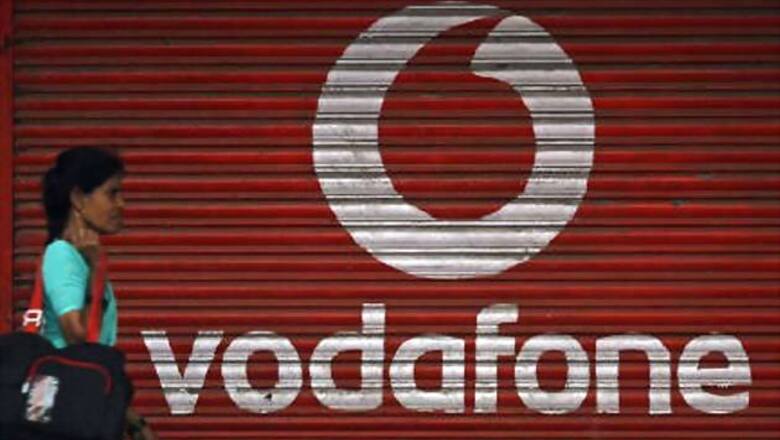
views
London: Vodafone posted a sharp drop in quarterly organic growth on Friday as an unexpected slowdown in emerging markets compounded tough conditions in Europe, prompting the group to say it would launch a new round of cost cuts.
Growth from emerging markets has helped to cushion the impact of Europe's weak economies in the last two years, but the key market of India showed some signs of slowing in the last three months.
"The significant point from these results is that emerging markets are no longer sufficiently rescuing poor performances from Vodafone's European markets," said Emeka Obiodu, senior analyst for telecoms at analysis firm Ovum.
Vodafone shares were down 1.9 per cent in mid-morning trade while European rivals Deutsche Telekom (DTEGn.DE) and France Telecom (FTE.PA) also slipped on the update from the world's largest mobile operator widely regarded as the strongest in the sector.
"It is not a disaster. It is just a slight miss," Espirito Santo analyst Will Draper told Reuters.
"The UK has shrunk, Italy has missed our numbers and the emerging markets growth is still pretty good but it has also clearly slowed in Turkey, India and South Africa."
While Vodafone has outperformed peers in the past year, tough conditions across Europe forced it to cut its medium-term outlook and write down the value of assets by 4 billion pounds in May, as customers sought to save money by making fewer calls and deferring handset upgrades.
The group reiterated its annual outlook on Friday and analysts welcomed the pledge for cost cuts as a sign the group would protect the earnings.
"Inevitably we are now about to embark on a new wave of cost initiatives, it is what you have to do when times are tough," Chief Executive Vittorio Colao told reporters.
Vodafone posted group service revenue of 9.98 billion pounds in its first quarter to end-June, up 0.6 per cent compared with a forecast for 0.9 per cent. That was down from 2.3 per cent growth in the group's fourth quarter, which benefited from the extra leap year day.
Vodafone said the emerging markets region was hit by the inclusion of Australia in the division, which has struggled for some time, while regulatory changes and a change to the way the groups sells data packages hit the numbers in India.
In Europe, Italy and Spain continued to struggle due to tough competition and weak consumer spending, while Vodafone also suffered from weak demand from small and medium sized businesses which use its corporate services. Britain slowed more than expected due to the weakening economy and aggressive pricing from Telefonica.
Nervous times
Finance Officer Andy Halford said it was difficult to be optimistic in the short term.
"Clearly consumers and businesses remain nervous in many territories, our sense is that we should prepare the business for a few more quarters that are going to be reasonably tough."
In the first quarter, the key figure of organic service revenue which strips out the cost of one-off factors such as handsets was down 1.6 per cent on an organic basis in Europe while the emerging markets division was up 6.1 per cent.
Colao said the one encouraging factor for the medium term was Germany, which showed a solid performance in part due to the roll out of its next-generation LTE technology, which should be rolled out across other European markets in the next two years.
"Vodafone results provided few surprises but a reminder (if we needed one) that wireless revenues are cyclical and that with the exception of Vodafone's largest European market, Germany, the macroeconomic environment is very tough," Bernstein analyst Robin Bienenstock said in a note.
"Vodafone confirmed full year guidance, which we think the company are still well placed to achieve even with a slight softening of results."
The other boost for Vodafone came on Thursday from its U.S. joint venture Verizon Wireless which reported strong results. That partnership is complicated however by the issue of whether it pays a dividend.
Shares in Vodafone had risen since May on expectations the group would again benefit from a dividend, following a $10 billion payout in July last year to the British firm and co-owner Verizon Communications (VZ.N).
However the stock fell on Thursday when the Verizon Finance Officer Fran Shammo said he did not expect to discuss a payout at the next quarterly board meeting.
Prior to the 2011 payment, the joint venture had not paid a dividend since 2005 which strained relations between the two sides, with Verizon able to block a payout and focus on paying down debt because it had a controlling stake as the owner of 55 per cent of the group.
"We are in July and there are a few more board meetings between now and the end of the year. Nothing and I mean nothing..." Colao said, before being interrupted by his finance director Halford, who simply said they would wait to see what happens.













Comments
0 comment